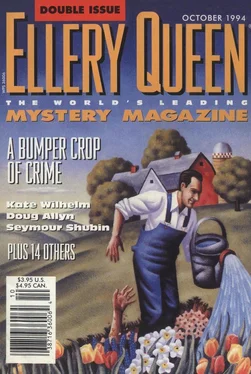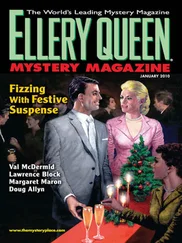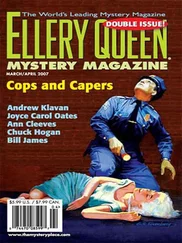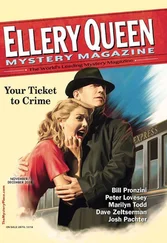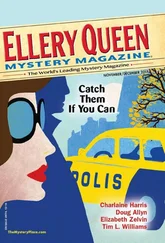Doug Allyn - Ellery Queen’s Mystery Magazine. Vol. 104, No. 4 & 5. Whole No. 633 & 634, October 1994
Здесь есть возможность читать онлайн «Doug Allyn - Ellery Queen’s Mystery Magazine. Vol. 104, No. 4 & 5. Whole No. 633 & 634, October 1994» весь текст электронной книги совершенно бесплатно (целиком полную версию без сокращений). В некоторых случаях можно слушать аудио, скачать через торрент в формате fb2 и присутствует краткое содержание. Город: New York, Год выпуска: 1994, ISBN: 1994, Издательство: Dell Magazines, Жанр: Детектив, на английском языке. Описание произведения, (предисловие) а так же отзывы посетителей доступны на портале библиотеки ЛибКат.
- Название:Ellery Queen’s Mystery Magazine. Vol. 104, No. 4 & 5. Whole No. 633 & 634, October 1994
- Автор:
- Издательство:Dell Magazines
- Жанр:
- Год:1994
- Город:New York
- ISBN:ISSN 1054-8122
- Рейтинг книги:4 / 5. Голосов: 1
-
Избранное:Добавить в избранное
- Отзывы:
-
Ваша оценка:
- 80
- 1
- 2
- 3
- 4
- 5
Ellery Queen’s Mystery Magazine. Vol. 104, No. 4 & 5. Whole No. 633 & 634, October 1994: краткое содержание, описание и аннотация
Предлагаем к чтению аннотацию, описание, краткое содержание или предисловие (зависит от того, что написал сам автор книги «Ellery Queen’s Mystery Magazine. Vol. 104, No. 4 & 5. Whole No. 633 & 634, October 1994»). Если вы не нашли необходимую информацию о книге — напишите в комментариях, мы постараемся отыскать её.
Ellery Queen’s Mystery Magazine. Vol. 104, No. 4 & 5. Whole No. 633 & 634, October 1994 — читать онлайн бесплатно полную книгу (весь текст) целиком
Ниже представлен текст книги, разбитый по страницам. Система сохранения места последней прочитанной страницы, позволяет с удобством читать онлайн бесплатно книгу «Ellery Queen’s Mystery Magazine. Vol. 104, No. 4 & 5. Whole No. 633 & 634, October 1994», без необходимости каждый раз заново искать на чём Вы остановились. Поставьте закладку, и сможете в любой момент перейти на страницу, на которой закончили чтение.
Интервал:
Закладка:
Melissa said, “Do you have children?”
They had one, Mrs. Williams said, then added with a smile that they’d just learned that another was on the way. Which, Melissa quickly replied, her hand instinctively going out to her, was exactly what we’d had — Becky had been three when we moved in and Katie was born eight months later.
“Where do your children live now?” Mrs. Williams asked.
When Melissa told her that Becky and her husband and two children lived right in the next township, and Katie and her brood were just about a thirty-minute ride away, Mrs. Williams turned to her husband and with a slight intake of breath said, “Wouldn’t Mother and Daddy just love that?” None of her brothers and sisters, she explained to us, lived within five hundred miles of her parents, and one even lived in Australia. “My parents say it all the time, if only one of you lived close. And they say it’s true of all their friends — every one of their children lives far away. You’re very fortunate.”
“And we know it,” Melissa said with a wise nod. “But you have to be very careful you don’t intrude on their lives.”
“I would say, hearing that, they don’t have that problem.”
We walked on through the first floor, Melissa and I taking turns — but almost always in response to their questions — to give other of the house’s attributes. Schools — absolutely great schools — “One of the big reasons I wanted to live in the township was the schools,” Melissa said. “And they’ve kept up. You can talk to anyone around here with children.”
Mrs. Williams nodded at that, for apparently she’d heard too.
“And the children,” Melissa went on, “are in walking distance — what could be nicer than that? And I mean to all the schools, not just grammar, but the middle school, the high school.”
“Now, that’s nice, ” Mrs. Williams said with a look at her husband.
What’s also nice, I said as we neared the kitchen, is that though you have all the advantages of a suburb, you can walk to the train to the city. And, oh yes, there’s a playground a few blocks away, and a pond where the kids go ice skating. And the police are very, very nice; and you may have passed it, there’s a fire station only about four blocks down the street.
Walking into the kitchen, Mrs. Williams stopped all at once and looked around and that smile of hers broadened. “Oh, I always wanted a kitchen like this. George, look,” and she pointed at almost everything — the copper pots that overhung the island, the large shiny stove, the refrigerator that released a crackle of ice with a touch, the round breakfast table near the windows overlooking the back garden. And in the midst of this, while nodding and agreeing with her how perfect it was, somewhere Mr. Williams found time to look at me and to say, almost apologetically, “This would be our first house.”
He’d caught me off guard, for during the past few moments, while my face might have been all light and air, I’d been thinking the darkest thoughts, the thing I’d been thinking about for so long — how this house had become a trap for me, how I had to get out, didn’t know what I’d do if I had to stay any longer.
Had said it to Melissa that day, maybe for the millionth time. Who’d given me the look of disdain it always produced.
“I’m sorry,” I said to him, “what did you say?”
“This would be our first home.”
“It was ours, too.” And with this it began to come back — though of late it seemed always at the edge of my consciousness — the little apartment we’d had over a real-estate office in center city. It was an apartment you had to walk up a long flight of narrow, wooden stairs to get to, and where each room was on a separate level. It was so cozy, just right for us. especially in winter when you’d see cars stalled and skidding around in the snow, and we’d feel so good and secure, putting on our boots to go out to eat or to a movie, while the rest of the world struggled with cars and distances. Even my office — a little one-man, storefront ad agency I’d started — was just around the comer.
There was such a sense of freedom living there.
I said to Mr. Williams, “Where do you live now?”
“A little apartment, but it won’t be enough for our needs now.” Still, did I detect a touch of sadness there?
“That was our problem,” Melissa said. “We had an adorable apartment.”
“I really didn’t want to leave,” I said. “It was like... something in Greenwich Village, I guess. But it didn’t serve our purpose anymore. And this place had everything. Has everything.”
I’d talked about moving for years, though this was the first time Melissa’d agreed to put the house up for sale. I’d come close to this point several times, but there was always something, some goddam something that stopped me. Where could you find a house this inexpensive? Where a more temperate climate, where cleaner air, nicer neighbors? Where would you find doctors as caring and tuned in to us as ours? And our medical records, our records! And the girls and the grandchildren, and two sons-in-law you could really talk to and call on for advice. And work — I was retired, but still did consulting, and though I didn’t really need to do it, you never knew, you never knew. And all my clients were in this area.
“This,” Melissa was saying, “was our Becky’s room.”
“Oh, you kept it just like it was,” Mrs. Williams said admiringly, looking at Melissa for confirmation.
“Yes,” Melissa said.
Mrs. Williams was referring to the cork paneling on the wall next to the bed, with old pictures and newspaper clips thumbtacked to it — Becky had been quite an athlete. And now in Katie’s room, there were three of her old teddy bears she deliberately kept here for her children when they visited, and the bunny-rabbit table lamp and the table-hockey game, with the few broken men, she always said she was going to take home.
All part of the trap, too, in a way. You know, don’t you, that memories can be a trap?
How I’d come to hate this house; oh, how I hated it! I’d loved it once, I did, but it had gone a million miles past serving its purpose!
My heart was going fast now, with anxiety. Let me be right about these people, I was thinking, let them—
“You know, George,” Mrs. Williams said, “I think this would be perfect for Gail’s room, and the other would be perfect for the baby. Don’t you think?”
“Yes.” He nodded quickly.
“Let me show you our room,” Melissa said, but she lingered behind for a few moments, gazing into Katie’s old room as though hating to release it.
Although a stranger wouldn’t ever detect it from her manner, she still didn’t want to move. I was sure. I knew her, she hadn’t changed. And it was probably even one of the reasons she didn’t want an agent, was hoping we couldn’t do it.
“Yes, this is a nice large bedroom,” Mrs. Williams said.
“Feel free to open the closets,” Melissa offered.
“Hmm,” Mrs. Williams said, pleased, at each open door.
In my study, Mr. Williams said, “Are you retired? I’ve the feeling you might be.”
“I am. But I still keep my hand in.”
“That’s always a good idea, I would think. What,” he soon asked his wife, “will we do with this room?” and there was such a tone of worry in his voice that I suddenly visualized it all ending here. Here!
I said quickly. “You can turn it back into a bedroom. That’s what it was.”
“Of course, George,” his wife said. “It’ll be an extra bedroom.”
“I mean all those bookcases,” he said. Then to me: “You must have two hundred books in this room alone. Do you have any idea how many you have altogether?”
Читать дальшеИнтервал:
Закладка:
Похожие книги на «Ellery Queen’s Mystery Magazine. Vol. 104, No. 4 & 5. Whole No. 633 & 634, October 1994»
Представляем Вашему вниманию похожие книги на «Ellery Queen’s Mystery Magazine. Vol. 104, No. 4 & 5. Whole No. 633 & 634, October 1994» списком для выбора. Мы отобрали схожую по названию и смыслу литературу в надежде предоставить читателям больше вариантов отыскать новые, интересные, ещё непрочитанные произведения.
Обсуждение, отзывы о книге «Ellery Queen’s Mystery Magazine. Vol. 104, No. 4 & 5. Whole No. 633 & 634, October 1994» и просто собственные мнения читателей. Оставьте ваши комментарии, напишите, что Вы думаете о произведении, его смысле или главных героях. Укажите что конкретно понравилось, а что нет, и почему Вы так считаете.
